Session Six - The Gospel According to Matthew
Author
Matthew (lit. "gift of God"; he was also called Levi - it was a regular custom in ancient Palestine for people to have two names) first comes to our attention as a tax collector in Capernaum whom Jesus called to follow him. We all know how despised tax collectors were; they held official positions of authority that involved extracting money from their own people to pay the Roman/Herodian (in the north, in Galilee) oppressors. These "tax farmers" were often extortionists, who collected more than they were required/entitled to; they took as much as they could get away with. Matthew was a man whose profession everyone despised. Tax collectors were banned from worshipping in the temple (cf Luke 18:13).
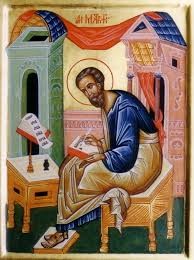
"As Jesus was walking along, he saw a man named Matthew sitting at his tax collector's booth. 'Follow me and be my disciple,' Jesus said to him. So Matthew got up and followed him. Later, Matthew invited Jesus and his disciples to his home as dinner guests, along with many tax collectors and other disreputable sinners. But when the Pharisees saw this, they asked his disciples, 'Why does your teacher eat with such scum?' When Jesus heard this, he said, 'Healthy people don't need a doctor - sick people do.' Then he added, "Now go and learn the meaning of this Scripture: "I want you to show mercy, not offer sacrifices." For I have come to call not those who think they are righteous, but those who know they are sinners.' " (Matthew 9:9-13).
Date of Composition
Biblical scholars believe that Matthew's Gospel was composed around 70AD, in Hebrew. Most Christians in Palestine were Jewish converts, so Matthew's focus on Jewish perspectives in this Gospel is understandable. The early church assumed that Matthew had been written by a disciple of Jesus.
Location, Purpose and Audience
"This is a record of the ancestors of Jesus the Messiah, a descendant of David and of Abraham" (Matthew 1:1).
Matthew's gospel is clearly written for a Jewish Christian audience living within the immediate proximity of the Jewish homeland. It is the most Jewish of all the gospels. His community observes the Torah. In Matthew, in the Sermon on the Mount, Jesus says, "Don't misunderstand why I have come. I did not come to abolish the law of Moses or the writings of the prophets. No, I came to accomplish their purpose. (5:17).
In Matthew, Jesus is a proponent of the Torah and its piety, just like the Pharisees. On one hand, they followed the Law in a way that made them seem like very good Jews. On the other hand, there were tensions over what constituted the proper form of godliness. Many of them - especially the Pharisees and Sadducees - stubbornly refused to accept Jesus as their Messiah. In spite of centuries of reading and studying the Old Testament, their eyes were blinded to the truth of who Jesus was. Jesus rebuked them for their hard hearts and their refusal to recognize the One they had supposedly been waiting for. They wanted a Messiah on their own terms.
Many of Matthew's references to Jewish traditions come without explanation or application; this was not necessary. Early Jewish Christians could not conceive of salvation apart from being a Jew first. This would create headaches when Gentiles began to become followers of Christ.
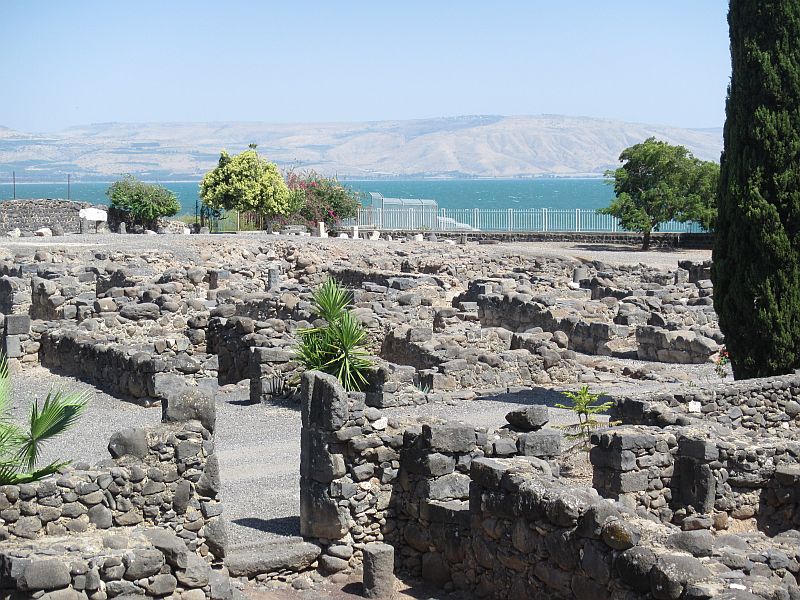
Capernaum
Themes and Theology
Matthew's record is biographical; it focuses on the person of Christ as Messiah & King. It is more extensive than Mark. Matthew became the most popular/quoted of the Gospels.
Matthew begins his gospel by outlining the genealogy of Jesus. He wanted to show that Jesus was the son of David, and traced this further back, to Abraham. For Matthew, Jesus is not only the son of David (the greatest king in ancient Israel), but he is also the son of Abraham (the patriarch). He is truly a man from Israel.
Matthew's account is about the good news of prophetic fulfillment. What was foretold long ago by the prophets has come about. Matthew's impression of Jesus is that he is of royal lineage, possesses divine authority, and has the prerogatives and powers of God. He is not a contradiction to Judaism but rather the climax and completion of Judaic faith. Matthew shows us that we could not have the NT if it were not for the OT and that Jesus would not be who He was if it were not for the God of Abraham, Isaac and Jacob.
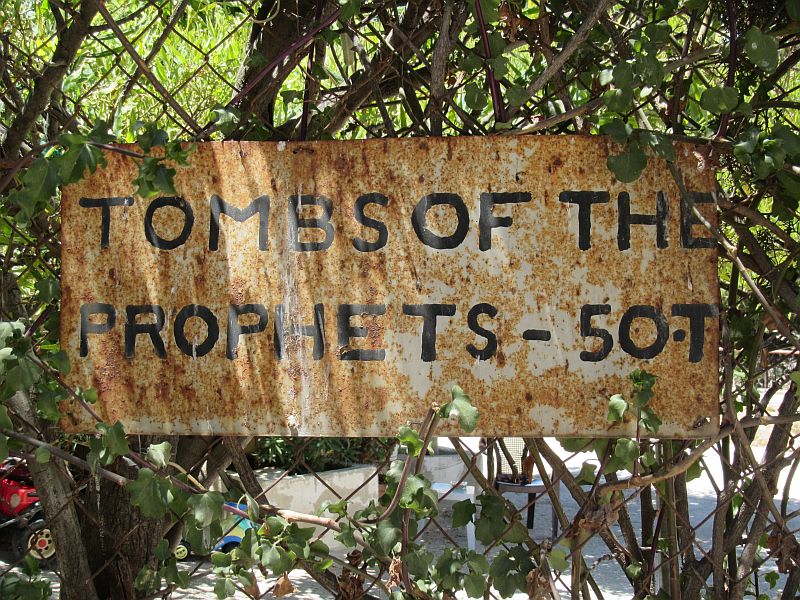
"Repent of your sins and turn to God, for the Kingdom of Heaven is near" (3:2).
Matthew speaks of the Kingdom of Heaven 32 times (the term does not appear anywhere else in the New Testament) and "kingdom" a further 20 times. Twelve of the 15 parables of Jesus recorded in Matthew start with the words "The Kingdom of Heaven is like ...". Only Matthew describes the coming of the wise men who came in search of the King.
Matthew shows Jesus coming into Jerusalem as king (22:21:5-7). Jesus describes sitting on the throne of His glory (25:31). Only in Matthew do we see the inscription on the cross "King of the Jews" (27:37).
When Matthew narrates an important event in the life of Jesus, he often calls the reader's attention to a prophecy in the Old Testament of which this event is the fulfillment. ''Now,'' he says, ''all this was done, that it might be fulfilled which was spoken of the Lord by the prophet" (Matt. 1:22). There are nine other instances of this in his Gospel. But many more times than this Matthew alludes to passages in the Old Testament (there are more than sixty OT quotes) as he relates his story.
The Gospel was obviously written by a Jew, and one who knew his Old Testament well. There does not seem to be a strong urge to connect with the Gentiles. Jesus is portrayed as having been sent to Israel (15:24).
Literary Style and Structure
Matthew's account of the Gospel is orderly and concise. He intends to prove to the Jews that Jesus Christ is the promised Messiah. He uses many forms of speech that Jews would have been comfortable with. In fact, he never bothers to explain Jewish customs, since his intended audience was a Jewish one.
Matthew begins his Gospel with the genealogy of Jesus, tracing Him back to Abraham, the progenitor of the Jews. From there, he quotes extensively from the prophets, frequently using the phrase "as was spoken through the prophet(s)" (Matthew 1:22-23, 2:5-6, 2:15, 4:13-16, 8:16-17, 13:35, 21:4-5). These verses refer to the Old Testament prophecies of Jesus' virgin birth (Isaiah 7:14) in Bethlehem (Micah 5:2), His return from Egypt after the death of Herod (Hosea 11:1), His ministry to the Gentiles (Isaiah 9:1-2; 60:1-3), His miraculous healings of both body and soul (Isaiah 53:4), His speaking in parables (Psalm 78:2), and His triumphal entry into Jerusalem (Zechariah 9:9).
The divine nature of Jesus (confirmed from before His birth, at His baptism, temptation and transfiguration) is a major issue in Matthew. He is the Son of God. The title Son of David identifies Jesus as the healing and miracle-working Messiah sent to Israel.
The dividing line in the Gospel is 16:21: "From then on Jesus began to tell his disciples plainly that it was necessary for him to go to Jerusalem, and that he would suffer many terrible things at the hands of the elders, the leading priests, and the teachers of religious law. He would be killed, but on the third day he would be raised from the dead."
The Sermon on the Mount
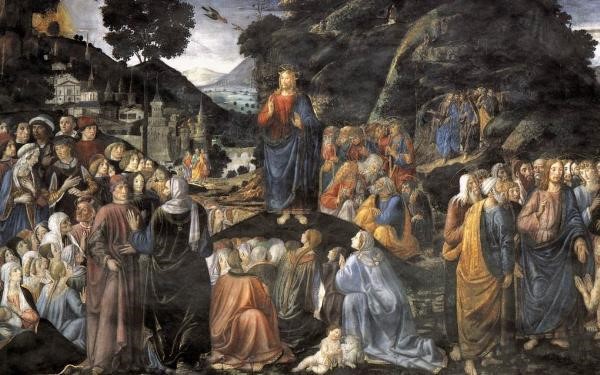
The so-called Sermon on the Mount is the arguably the greatest part of Matthew's record. This, and other lengthy passages, are helpful in bringing us Jesus' words in detail. Jesus is still a healer and miracle worker, but we hear Him in ways we do not elsewhere. We can glean much from this passage to show us how we are to live as disciples/Christians.
One day Jesus went up a mountainside and spoke to His disciples and the crowds of people. This "Sermon on the Mount" outlines the right ways for us to approach God and to deal with other people. Let's unpack it a bit.
Jesus' teaching takes up 60% of Matthew's Gospel
The Beatitudes (5:3-12)
Jesus said the truly fortunate people are those who are rich in the things that matter to God, not those who have money, power, popularity or fame. What is important in God's kingdom are often the opposite of the things we find so attractive. He gave this list of traits of people who find God's blessings:
- The poor in spirit may lack money, fine clothes, luxury cars or even the necessities of life, but they put their trust in God instead of in worldly things.
- Those who mourn feel sorry for bad things they have done.
- The meek are gentle, patient and ready to put up with and forgive other people.
- Those who hunger and thirst for righteousness have a deep longing to obey God perfectly.
- The merciful are generous, forgiving and compassionate. They try to relieve the suffering of other people.
- The pure in heart are morally upright and sincere. Their thoughts and motives are pure as well as their outward actions.
- The peacemakers work for reconciliation and understanding to prevent bitterness, family disputes, lawsuits, hostilities and war.
- Those who are persecuted for righteousness' sake may suffer teasing, ridicule, discrimination or even physical harm because of their faith. We are not to seek persecution but to accept it cheerfully as the price of God's blessings.
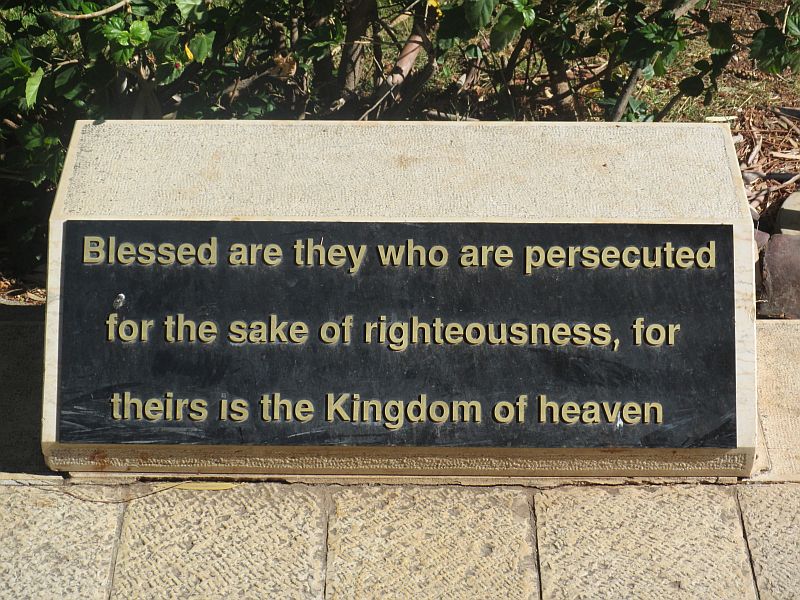
On the Mount of the Beatitudes
Anger and Revenge (5:21-26, 38-48)
One of the Ten Commandments says, "You shall not murder," but Jesus said "don't even stay angry or hold a grudge against another person"! If we think about revenge, we are already into sin. We should try to be on good terms with everyone.
The Old Testament law was based on the principle of "An eye for an eye, a tooth for a tooth." In other words, if someone was injured, the person who caused the hurt should be injured in the same way. But Jesus said that we should not try to get even at all. Holding a grudge can consume us with hatred. A grudge clouds our judgment and may lead us to an act of revenge that can never be undone.
Jesus said we should love our enemies! Just as God loves all His children, we must show kindness and respect even to those people who want to do us harm. That is always a hard message to receive and live by. Jesus never asks us to do what He was not prepared to live by first.
Putting aside fears, prejudices, resentments and hatreds and showing Christian love and compassion for all people is the mark of true children of God. Anger, hatred, harsh words, retaliation and revenge only result in more of the same. Only love can conquer evil (cf Romans 12:17-21).
Marriage (5:27-32)
Jesus said that marriage is meant to last for a lifetime. Not only must be we faithful to our spouse, we must not even think about being unfaithful. And we must do everything possible to avoid divorce.
The Lord's Prayer (6:9-13)
The Lord's Prayer is Jesus' model of prayer. We are to avoid meaningless religious repetition. Many Christians recite this prayer in church every Sunday but seldom stop and think about what it really means and how it applies in their lives
"Our Father in heaven, may your name be kept holy." God is the master of the universe. He is holy and all-powerful. But, like a father, He also loves and protects us. We wish for all people to honor God and His holy name.
"May your Kingdom come soon. May your will be done on earth, as it is in heaven." God's kingdom is within the hearts and minds of those people who put their faith and trust in Him and obey His commands (Matthew 3:2, Luke 17:20-21). We pray for more people to trust and obey God and become part of His kingdom (Mark 4:30-32).
"Give us today the food we need." Everything we have is a gift from God. We ask God to give us the food and other things we need for daily life (this is reinforced later in the chapter).
"... forgive us our sins, as we have forgiven those who sin against us." Our sins are like "debts" owed to God. We ask God to forgive us for doing things that are wrong and for failing to the good things we should. We must also forgive other people who have done wrong to us. We cannot expect God to forgive our sins while we are holding a grudge or seeking revenge against another person (6:14-15, 18:23-35).
"And don't let us yield to temptation, but rescue us from the evil one." Every day we are tempted to commit sins such as greed, immorality, hatred, revenge, theft and gossip (Matthew 15:19-20, Luke 12:15, Galatians 5:19-21). We pray for the strength to resist these temptations of daily life (James 1:12-16). We ask God to protect us from Satan's power to fool us into thinking wrong is actually right (Genesis 3:4-5, 1 Corinthians 10:13, 2 Corinthians 11:3, 11:13-15).
"For yours is the kingdom, and the power, and the glory, forever." This doxology, or brief hymn of praise, was from 1 Chronicles 29:11.
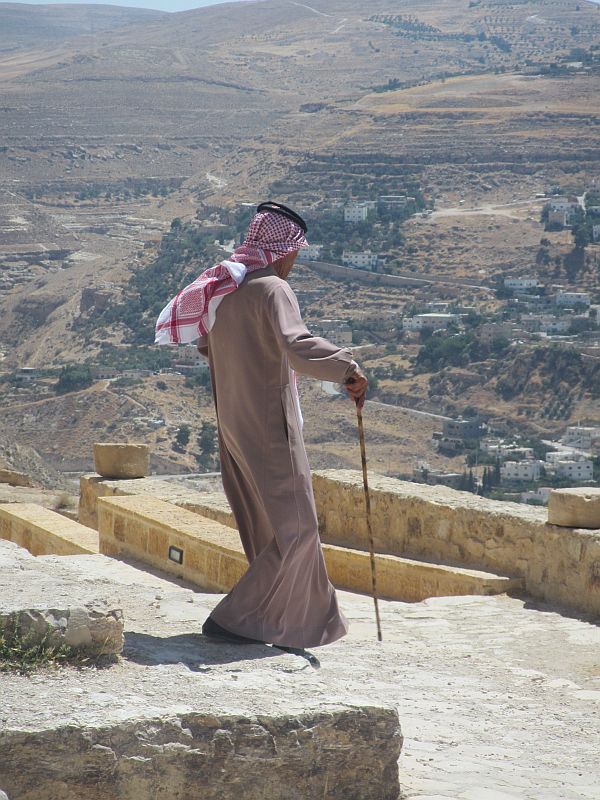
Different cultures ... same spiritual needs
Money (6:1-4, 6:19-21, 6:24)
In Old Testament times, people thought being rich and having nice clothes and big houses were signs of God's favour. Jesus said just the opposite: being rich can actually distract us from our duties to God and other people (Matthew 19:23-24, Luke 12:15). Rather than putting our trust in the uncertainty of money and things, we must put our trust in God:
"Don't store up treasures here on earth, where moths eat them and rust destroys them, and where thieves break in and steal. Store your treasures in heaven, where moths and rust cannot destroy, and thieves do not break in and steal. Wherever your treasure is, there the desires of your heart will also be." (6:19-21). "No one can serve two masters. For you will hate one and love the other; you will be devoted to one and despise the other. You cannot serve God and be enslaved to money" (6:24).
The "Golden Rule" (7:1-5, 7:12)
"Do to others whatever you would like them to do to you. This is the essence of all that is taught in the law and the prophets. (7:12)
This simple rule is a good summary of all Jesus said about how to treat other people. We should do acts of kindness for other people in the same way we would like to have acts of kindness done for us (but not as a pre-condition). Also, we should not do or say anything to another person that we would not want someone to do or say to us.
Don't Worry - Trust in God (6:25-34, 7:7-11)
Jesus said we should not worry too much about worldly things like food and clothes. We need food and clothing, and we must work to pay for the things we need. But our spiritual life is much more important than these day-to-day cares and worries. If we pray to God, He will make sure we have the things we need (but not necessarily everything we want).
"So don't worry about these things, saying, 'What will we eat? What will we drink? What will we wear?' These things dominate the thoughts of unbelievers, but your heavenly Father already knows all your needs. Seek the Kingdom of God above all else, and live righteously, and he will give you everything you need. Don't worry about tomorrow, for tomorrow will bring its own worries. Today's trouble is enough for today." (6:31-34)
Jesus directed the Sermon on the Mount primarily to His disciples (Matthew 5:1-2). "Disciple" means a person who learns from a teacher, and Jesus had many more disciples than just the twelve (7:28-29; 8:21).
Interpretations other than the plain meaning have been invented to explain away many of Jesus' difficult sayings, but Jesus said all these same things in other ways at other times. So, it is good to assume that the Sermon on the Mount is meant as a model for us as Christians. We can never completely live up to the high goals Jesus set for us, but this passage describes the goals we try for every day (5:48).
Jesus said that God requires more of us than just living by a set of rules, as in the Old Testament. Many people in Jesus' time lived strictly by the Old Testament rules and add-ons, but still found enough "loopholes" to live lives of sin and greed. Jesus said that they were hypocrites - like drinking cups that were washed clean on the outside but they were filthy inside, where God could see (23:25-26).
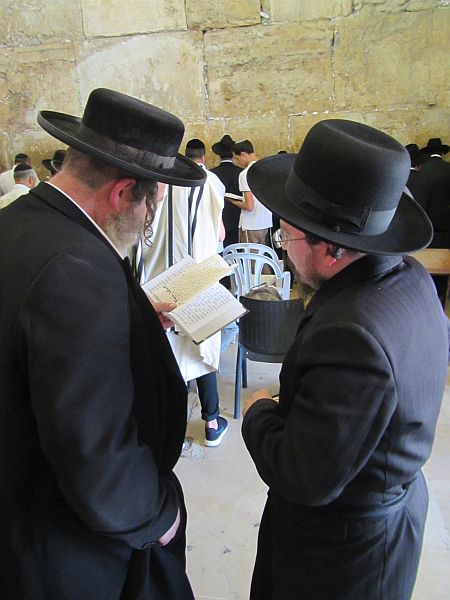
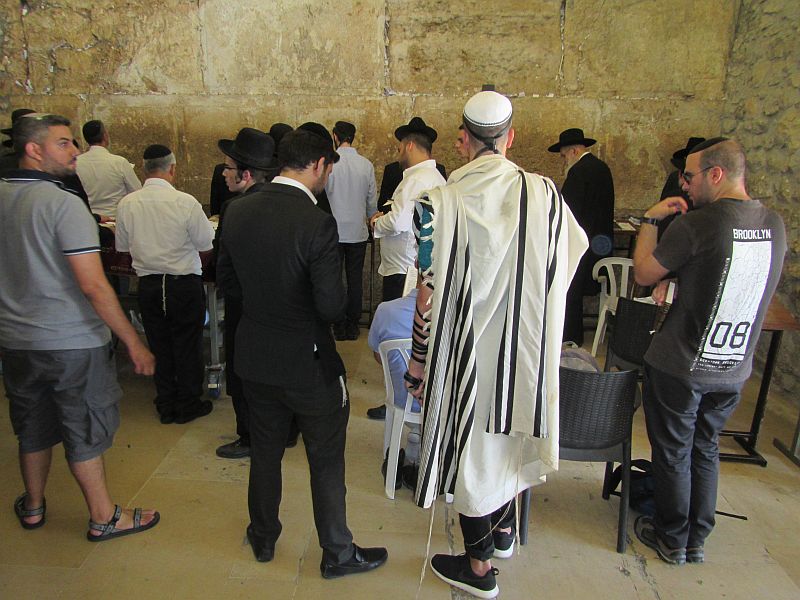
Rather than outwards shows of holiness, it is our inner lives (attitudes and motives) that really matter to God. Jesus said we should live by two great principles: 1) humble obedience to God above all else and 2) sincere respect and kindness for all people (Matthew 22:34-40, Mark 12:28-31, Luke 10:25-28, John 13:34-35). If we live by these principles, we don't have to worry about slavishly following a set of rules; living by them will follow.
Faith - Forsaking All I Trust Him
The healing of the centurion's servant (5:8-13) and the Canaanite woman's daughter (15:21-28) shows the simplicity and power of trusting in Jesus' authority in our lives.
Peter's Confession and the Church
Only Matthew talks about "the church", the ekklesia, or "called out ones", in the context of the revelation of who Jesus was, "the Christ, the Son of the Living God" (16:13-19). We are the "called out ones", called out from the world into God's family, the Christian community. See also 18:15-21.
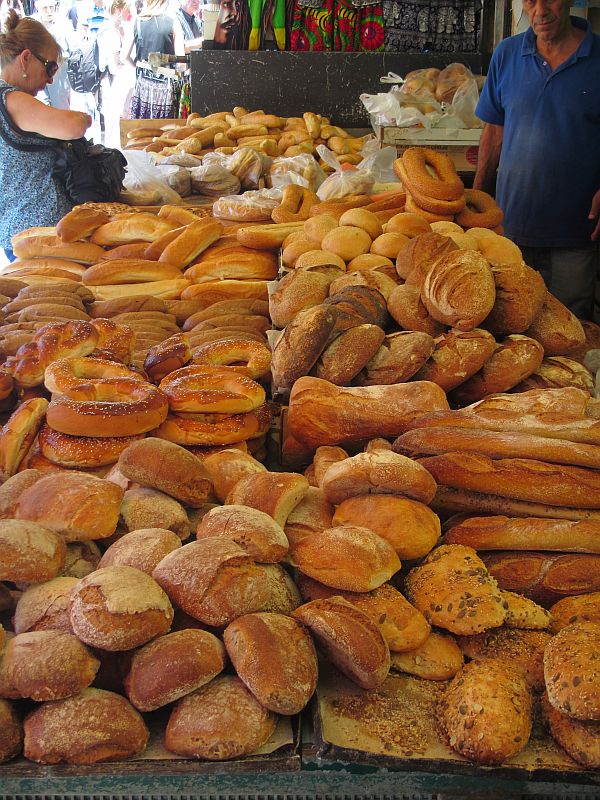
Miracles in Matthew - "he healed them" (4:24)
| Miracle | in Matthew | Demonstrated Jesus' Power Over |
|---|
| 1. | Man with leprosy | 8:1-4 | sickness |
| 2. | Roman centurion's servant | 8:5-13 | sickness |
| 3. | Peter's mother-in-law | 8:14-15 | sickness |
| 4. | Calming the storm | 8:23-27 | nature |
| 5. | Two men possessed with demons | 8:28-34 | spirit world |
| 6. | Man with palsy | 9:2-7 | sickness |
| 7. | Jairus' daughter | 9:18-26 | death |
| 8. | Woman with bleeding | 9:20-22 | sickness |
| 9. | Two blind men | 9:27-31 * | sickness |
| 10. | Dumb, demon-possessed man | 9:32-33 * | spirit world |
| 11. | Feeding 5,000 | 14:14-21 | nature |
| 12. | Walking on water | 14:22-32 | nature |
| 13. | Canaanite woman's daughter | 15:21-28 | spirit world |
| 14. | Feeding 4,000 | 15:32-39 | nature |
| 15. | Boy with demon | 17:14-21 | spirit world |
| 16. | Fish with coin | 17:24-27 * | nature |
| 17. | Two blind men - including Bartimaeus | 20:29-34 | sickness |
| 18. | Fig tree withers | 21:18-22 | nature |
| 19. | Jesus' own resurrection | 28:1-11 | death |
| * These appear only in Matthew. |
"He took up our infirmities and bore our diseases." (8:17)
Parables of Jesus recorded in Matthew
Jesus used parables as teaching aids that can be used as analogies or a comparison of something earthly with a heavenly meaning. They gave the disciples (and us) great examples on how something that might be overlooked or might be hard to understand could be more easily understood with something or some things that are more familiar to them. The examples that Jesus used might not be as familiar to us as they were to His disciples, so sometimes we have to look carefully at the context of Jesus' words to see what He is trying to teach them and us.
In Matthew we have 17 parables. In Chapter 13, six begin with the phrase, "The kingdom of heaven is like..." The first one is also about the kingdom, from its explanation in 13:19. The last one doesn't begin that way, but it talks about a disciple of the kingdom.
- The sower and the soils (13:1-9)
- The tares (13:24-30) *
- The mustard seed (13:31-32)
- The leaven (13:33)
- The hidden treasure (13:44) *
- The costly pearl (13:45-46) *
- The dragnet (13:47-50) *
- The householder (13:52)
- The lost sheep (18:12-14)
- Unmerciful servant (18:23-35) *
- Labourers in the vineyard (20:1-16) *
- Two sons (21:28-31) *
- The wicked husbandman (21:33-43)
- Marriage of the King's son (22:1-14) *
- The faithful servant (24:42)
- The wise and foolish virgins (25:1-13) *
- The talents (25:14-30) *
* These appear only in Matthew.
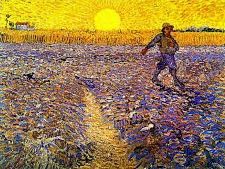
"A farmer went out to plant some seeds"
Other Examples of Figurative Speech
- Wise and the foolish builders (7:24-27)
- Patches and wineskins (9:16, 17)
- The strong man bound (12:29)
- Jesus' true relatives (12:46-50)
Controversies in Matthew
In Matthew's Gospel the Pharisees were (constantly) Jesus' main opponents throughout his life. Look at 15:1-20 and 16:1-12. They lived by the Law, but Jesus taught them that the law was underpinned not by judgement, but God's love & mercy. This was revolutionary.
Jesus' attitude towards the Sabbath (5:17-20) plays a crucial part in Matthew's argument.
John the Baptist's disciples queried Jesus about fasting (9:14, 15).
Eschatology ("last things") in Matthew
This Gospel contains the great discussion about the end of times, judgement, the second coming, countered with warnings about false Messiahs and pressures on believers from the world.
The Passion in Matthew (26:6-28:20)
Matthew draws our attention to OT prophecies about the passion of Jesus, eg
| Ps 118:25, 26 | 21:9 | Jesus' triumphal entry to Jerusalem |
| Zech 11:12, 13 | 27:8-10 | Judas' wages for betraying Jesus |
| Jer 32:6-9 | 28:9-10 | Purchase of a field |
| Ps 69:21 | 27:24 | Jesus given wine mixed with gall to drink |
| Ps 22:8 | 27:35 | Soldiers gamble over Jesus' clothes |
| Ps 22:7 | 27:39 | Passers-by mock Jesus |
| Ps 22:8 | 27:43 | Jesus is taunted |
| Ps 22:1 | 27:46 | Jesus' cry from the cross. |
Judas agrees to betray Jesus to the authorities, hoping for his execution. Jesus enters Jerusalem in triumph and drives the money changers from the temple, has a last meal with his friends; prayers in the garden and is betrayed. He is tried by the Jewish Sanhedrin (the Council) and before Pontius Pilate. He is crucified as king of the Jews, mocked by all'; He dies. Then there is an earthquake, the veil of the Temple is torn in two, and saints rise from their tombs. Jesus is buried and a guard is posted outside the burial tomb.
Early in the morning on the first day of the week Mary Magdalene and another Mary discover the empty tomb, guarded by an angel, Jesus appears to the disciples and tells them to meet Him in Galilee. The disciples return to Galilee, where He comes to them, tells them that He has been given "all authority in heaven and on Earth. He sends them out to make disciples of all nations. He will be with them (and us) always.
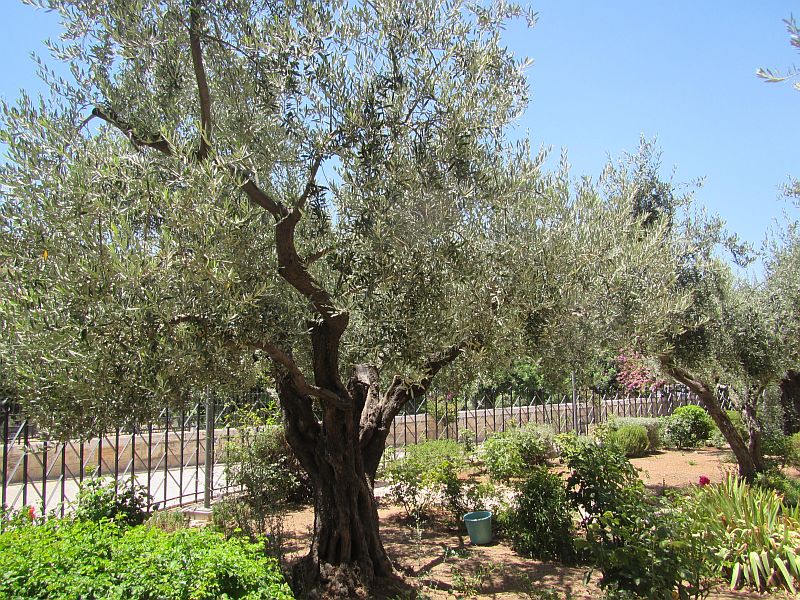
Olive Tree in Garden of Gethsemane
The Great Commission (or the Great Omission)
"Go and make disciples!!!"
Chapter 10 describes Jesus sending out his disciples on mission. The Great Commission shows the Gospel extending to all nations, beyond the original Jewish audience, and in line with God's promise that all the nations of the world would be blessed through Abraham's descendant (Jesus).
"The harvest is plentiful but the workers are few. Ask the Lord of the harvest, therefore, to send out workers into his harvest field."(9:37, 38)
For Reflection:
- Jesus said that we need to turn from our sins and become like little children, in order to get into the Kingdom of Heaven (18:3).
- Jesus demanded a righteous lifestyle that exceeded the legalism of the religious leaders of His time; what do we rely on, external appearances or inward change and obedience based on relationship with Him?
- Jesus said that we are to be "salt" and "light" in our world - how can you be salt and light in yours?
- Jesus calls the weary and heavily laden (12:28-30). Do you respond to His invitation?
- Are you "ready", given that Jesus could return when you least expect?
- Jesus prayed, "Your will be done" - can we honestly pray and live like this?
- Jesus will be with us until the end; how does this impact the way you live?
- Consider the cost of discipleship as outlined in 8:18-22 and 19:16-13.










